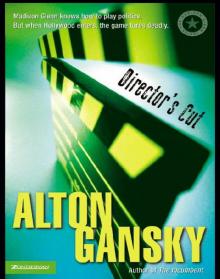- Home
- Alton Gansky
Zero-G Page 2
Zero-G Read online
Page 2
To combat SAS, flight doctors had tried several medications including scopolamine, but the drugs could act like a sedative or blur vision, neither welcome on space flight. The patch was the latest and most promising. It released a combination of meds over time, was easy to apply, and could be manufactured to suit the needs of each astronaut based on age, weight, gender, and susceptibility to the disorder.
Tuck didn’t like them because they were worthless to him. He was a definite “lead head,” a term other astronauts used to describe those who were oblivious to the effects of space travel. Since Tuck appeared immune to SAS, he had requested the smallest dose possible and only wore one as part of the experiment.
Tuck had never felt SAS until he awoke a few minutes ago. In a gesture of instinctive frustration, he ripped the patch off his neck.
Tuck shook his head. “Stop woolgathering.” He forced his mind to focus on Finn. He felt as if he were swimming in syrup. Nothing moved at the right speed.
“Houston, Atlantis.”
“Go, Atlantis.” The voice was CAPCOM again.
“We . . . um . . . recommend alternate frequency.” Encryption was the word he really wanted, but that alone might alert any eavesdropping country or amateur radio operator to the problem. Of course, he had said enough to raise the hackles of anyone with just a little knowledge of the mission.
“Understood, Atlantis.”
Tuck spun and pulled himself to the front console. A quick adjustment and the encryption communication went active.
“Houston, how do you read?”
“We hear you just fine, Tuck. Media is off loop. I took them off-line when contact broke.”
“Tell DH he may want to lock the doors.”
There was a pause. The phrase sounded innocuous enough, but everyone associated with the Space Shuttle knew the reference. On February 1, 2003, Columbia burned up on reentry. The first sign of trouble came when Flight Director Leroy Cain said, “Lock the doors,” meaning that no data was to leave the mission control room. He locked down communications with the outside. Tuck wanted Dieter Huntz, the flight controller, to do the same. The suggestion carried a lot of painful weight.
A moment later, Rick Van Duren’s voice crept into Tuck’s ear. “Already done, Tuck. Talk to us.”
“Finn is dead. He was floating around the flight deck. I have him in the PS seat now.”
“Tuck, this is Surgeon again. Are you certain he is dead?”
“I know dead when I see it, Doc.” Tuck moved to the pilot’s seat on his right. “I’m checking on Jess now.” He put a hand under her chin and lifted. Her face was pale but not cyanotic. He felt for a pulse. Nothing. He started to pull away, then tried again. It was there. Weak and thready, but it was there. “I have a pulse, but she is still unconscious.”
Tuck let Jess’s head down, easing her chin to her chest. He pulled his hand away and grazed the dermal patch she wore. He stopped. “Wait one, Houston.”
He pulled closer and stared at the flesh-colored patch. A red line circled it and the skin beneath was swollen.
Moving to his right, Tuck performed the same finger-to-carotid-artery test on Russ Deaver. Russ was the senior payload specialist. Russ had a pulse, stronger than Jess’s but not what it should be. Tuck didn’t have to look long to see the red ring around the dermal patch.
“Houston, there’s something going on with the SAS patch.” He described the skin anomaly.
There was a pause. “Remove patch, Commander. Right away.”
“Roger that. What about the others?”
“Yes, and bag and stow the patches.”
Tuck stripped the patches from the necks of Jess and Russ, retrieved one of the many plastic bags used for sealing food and bits of trash, and placed them inside a stowage compartment.
Next, heart stuttering, Tuck pushed himself to the mission station on the starboard side of the flight deck. Mission Specialist Jodie Law’s arms floated before her, her long brown hair forming a halo. No matter how hard Tuck tried, he could find no pulse.
Tears trickled from his eyes, broke free of their meager grasp on his face, and floated in air as tiny spheres. Jodie was the youngest of the crew — just thirty-two. In Houston, her five-year-old daughter waited for her mommy. Same brown hair. Same blue eyes. Same infectious smile.
Tuck began to weep.
“Atlantis, Houston.”
Tuck pulled himself into a ball. The motion moved him slowly forward and up toward the upper windows. Normally, Earth would fill the panes, but Atlantis’s unusual position and attitude only allowed a view of deep space, a blackness too profound to comprehend.
“Atlantis, Houston. Talk to me, Tuck.”
Tuck didn’t want to talk; didn’t want to listen; didn’t want to feel or think or be aware of anything outside the emotional vault he was building.
“Commander Tucker, respond.”
The spinning thoughts in Tuck’s mind slammed together and crumbled. Vinny. Vincent Pistacchia Jr. Where was Vinny?
Adrenaline poured into his veins and Tuck snapped his head around so fast it caused his body to spin. He steadied himself.
“Moving to middeck, Houston. Stand by.” Tuck didn’t wait for a response. The long headset line that allowed him to move around the flight deck when in orbit was too short to reach the deck below. It took only a second for Tuck to disconnect it and start for the inter-deck access hatch behind and to the port side of the commander’s seat. Tuck pulled himself down the ladder headfirst like a man swimming to the bottom of a pool.
The middeck was the middle of Atlantis’s three decks. One deck below that was the lower deck, a place for ductwork, wires, and the like. His concern was with flesh and blood, not insulation and instrumentation.
The compartment stood empty. The sight of the abandoned space made his already tripping heart stutter. He took several deep breaths to calm himself. Each action made the pain in his head rage. Against his will, his eyes crashed shut, lids tightening until tears squeezed out.
A few moments later, the agony diminished and he felt his jaw relax. “Pull yourself together, Tuck.” Sleepy. The profound weariness returned. This time he tortured the other cheek.
Sleep.
That was it.
He pushed across the open compartment making sure he didn’t smash a shin on the latched table at the forward end of the small space. On the opposite side, the starboard side, were the sleep stations: three horizontal beds stacked so closely they made submarine bunks seem spacious. A vertical sleep space, essentially a sleeping bag tethered in place, was just aft of the bunks — it was empty.
Tuck launched himself to the sleeping area harder than necessary and it took some effort to keep from smashing his head into the metal structure. He pulled the first privacy screen to the side. Empty. He moved to the middle bunk. Also empty, as was the bottom.
“Think, Tuck. Think.”
The head? On the orbiter the bathroom bore the more noble moniker “Waste Management Compartment.” Astronauts had more colorful names for the small space where men and women did the business necessary of all biological entities.
“Be there, Vinny. Be taking a bio-break.” Tuck shoved off the bunk rack and moved like a missile to the WMC at the left rear of the middeck. He jerked the privacy curtain aside.
No Vinny.
Next to the privacy curtain stood the personal hygiene station, a place where crew could shave, clean up, and do other routine personal chores. A mirror hung on the surface. Tuck let his eyes drift to his reflection. He saw his sandy brown hair, strong jaw, trim face, and near empty hazel eyes.
Uncertain what to do, Tuck let himself drift above the middeck until he felt something hard against his back. He had drifted to the airlock hatch.
Something flickered in his mind. A brief image.
Then it came through the haze like a speeding freight train.
“No. Oh, no. Dear God, no, no, no.”
Tuck pushed forward and up the interdeck access,
rapping his knee as he did so. The pain didn’t matter. He didn’t want to do what he did next, didn’t want to see what he knew he would.
His next act required more courage than anything he had done before, including sitting atop tons of rocket fuel. He forced himself to look out the aft viewing windows, the ones that looked over the orbiter’s cargo bay. The cargo doors were open as they always were once the Shuttle reached orbit. What ripped his breath away was the site of the RMS sticking into the darkness like one leg of a praying mantis. The Remote Manipulator System had been in use when whatever happened, happened. At the end of the fifty-foot, thousand-pound arm stood a human figure clad in a space suit.
“Vinny.” The name trickled from Tuck’s lips.
Puzzle pieces of memory rained in Tuck’s consciousness. Vinny was doing an extravehicular procedure. How long had he been out there?
Tuck keyed his mike. “Vinny. Do you read me, Vinny.”
No response.
“Houston. I can’t raise Vinny. He’s EVA.”
No response.
Tuck touched his mike, then realized the problem. He reeled in the loose end and plugged it into a com port. “Vinny, this is Tuck. Do you read?”
Nothing.
“Houston, I can’t raise Vinny. He’s EVA.”
“Tuck, we know about Vinny.”
A second passed before Tuck made the connection. Houston monitored vital signs of any astronaut who worked outside the safe confines of the orbiter. Vinny would have been wired up before donning his EVA suit. Once Tuck had stabilized the spinning Shuttle, communications were reestablished and FCC would be able to read Vinny’s vitals.
“Why didn’t you tell me, Rick? Why?”
“Tuck, your emotional state is fragile. We don’t know why, but you’re the only conscious crewman. We need you to be at your best and you’re not. Telling you too soon could have made matters worse.”
“How can it get worse?” His eyes ran to the video monitors that showed Vinny’s lifeless body perched on the end of the RMS.
“How much do you remember, Tuck?”
“Not much, Rick. Not much. My brain is still clouded.”
“In addition to delivering supplies to the Internation Space Station, part of your mission was a simple repair on a DOD satellite. Of course, the Department of Defense wants that part secret. Sometime during that mission, Atlantis began to spin. With the vehicle moving like it was, we lost signal from the Ku-antenna. What data we had indicated that RMS had been activated. We had no consistent contact with you for three hours.”
“Three hours?”
“We couldn’t maintain enough of a signal to override from down here.”
“This can’t be happening.”
“It is, Tuck, and we aren’t out of the woods yet. There are some things we want you to do.”
“I know what I need to do. I’m going out to get Vinny.”
“No, sir. No, sir, you are not. You’re in no condition to do that. You’re the only one conscious, and you can’t get into an EVA suit without help.”
“I have to try, Rick. I can’t leave him out there.”
“Listen to me, Tuck. You know you can’t do that. Vinny is dead. I know that’s a hard and cold thing to say, but you have to face that. Now we have a list of things for you to do.”
“NASA always has lists.” The pain in his head flared. He groaned and waited for it to pass.
“You got that right, buddy.”
Rick had a lighter tone in his voice and Tuck recognized it for what it was — an attempt to lift his spirits and give him confidence. It failed.
“I’m going to walk you through this one step at a time, pal. Just stay with me.”
Tuck pulled himself to the aft windows and stared at his friend Vinny. For a moment, he thought he saw the dead man wave.
TWO
Rick Van Duren leaned back in his chair. If any of the other members of the flight control team at FCC in Houston were to look at him they would see a man unperturbed by the disaster taking place two hundred miles overhead. The only sign of nerves came from his rhythmic stroking of the mike boom that hovered above his jawline.
“How’s he doing, Rick?” The voice came over the headset and without the customary, “CAPCOM, Flight.” Rick knew who was speaking. He also knew the question was nothing more than small talk leading to something more pressing.
“So far so good, Flight, all things considered. He has the Ku-antenna realigned for the present attitude. The giddiness seems to have gone, as has the melancholy. He’s coming across more emotionally stable. I think removing the patch helped.”
“That’s my take.”
Rick waited for Flight Director Dieter Huntz to get to what was really on his mind.
“You know him better than anyone, Rick. Can he fly Atlantis?”
Rick didn’t respond at first. He and Tuck went back to their days at Annapolis and had served on the same aircraft carrier.
Dieter activated his mike again. “Give it to me straight, Rick. I don’t want any of that astronaut machismo.”
Rick sighed. “No, Flight, he can’t. In any other circumstance, I would put my life and that of my family in his hands, but at the moment, I wouldn’t let him steer a riding lawn mower.”
“Flight, this is Surgeon. I concur. Commander Tuck’s response time is at least 25 percent slower than normal.”
“Now that the patch is off, Surgeon, can we expect him to revive?”
“Flight, we don’t even know for certain that the patch is the problem. It appears related, but I have no way of telling. I need to do a tox screen and I can’t do that down here. We won’t know anything until we get results from the test group.”
Rick thought of the three volunteer astronauts who donned the same patches. Some of the other flight surgeons were monitoring their health in hopes of determining the source of the problem. Rick would have volunteered himself, but he didn’t want to leave his post.
“Our options are narrowing, gentlemen.” Dieter’s voice sounded distant to Rick even though only a handful of steps separated them. “Ideally we’d have them dock with the space station, off-load the crew, and use what medical equipment we have there, but Tuck isn’t in any kind of condition to make that happen. If he . . .”
Rick finished Dieter’s sentence in his mind. If he messes up, Tuck kills not just himself and the rest of the surviving crew but three men on the ISS. The thought had been haunting Rick’s mind.
“The longer they stay up there, the greater chance Jess and Russ will die too.” Bob Celtik groaned into his mike. “Removing the patches was the right thing to do, but we don’t know if we removed them too late.”
“Russ and Jess need medical treatment beyond what they can get on the space station,” Rick said. “Flight, I suggest we go autoland.”
“The autoland system wasn’t designed to bring the Shuttle back with crew on board. It was meant to allow us to land the vehicle after the crew was safe on the ISS.”
Rick knew this information well. He had been one of the astronaut advisors on the project. Since Columbia’s tragic burnup over Texas in 2003, engineers developed new safety protocols in the event of damage to the Shuttle during launch. One of the first things a crew did once in orbit was to use the RMS arm to examine the heat tiles and wings. If the craft had sustained life-threatening damage, then the crew would dock with the International Space Station, disembark, and let FCC land it empty of the crew. The ISS, depending on the number of astronauts on the station and on the orbiter, could sustain them for eighty to one hundred ten days. NASA would send another Shuttle to bring them home.
A complete autolanding had never been done. Much of a Shuttle’s return was automated, handled by a computer, but certain functions like deploying air sensors that aided the computer in its flight, lowering the landing gear, and deploying the drag chute required a human on board. Recent modifications allowed NASA to handle even those tasks.
Another problem plagued the idea
of autolanding with a crew on board: tests had shown that the computers tended to bring the craft in too fast, and too fast meant possible tire failure. It would be a disaster to lose an empty Shuttle that way; it was beyond tragic to lose a crew.
“Flight, I don’t think we’re playing this hand; it’s playing us. No matter what decision we make it will be second-guessed.”
“We don’t make this decision, Rick, I do.”
“Negative, Flight. Whatever decision you make, you make in consultation with all of us. No one is going to leave you twisting in the wind.”
“I guess this is where I make the ‘failure is not an option’ speech.”
Rick turned his chair and looked across the space that separated them. “You know Gene Krantz never said that.” They were words he should have offered with a smile, but he couldn’t manage it. Krantz was a NASA icon, the mold from which every other flight director shaped himself. Krantz and his team were at the helm to bring the injured Apollo 13 flight home.
“No, but he lived it.” Dieter pursed his lips.
A motion at the back of the room caught Rick’s attention. Security escorted a woman and two children into the room. With them were a couple of suits Rick recognized as NASA execs.
His gut twisted. . . .
The pain in Tuck’s head diminished to a mere crushing sensation. He had never experienced a migraine, but his wife had. Next time he would be more sympathetic.
If there is a next time.
“Atlantis, Houston. Got time for a phone call, buddy?”
A phone call? “I’m not interested in buying any more magazines, Rick.”
“You want to take this, Tuck. And no worries. I’ll pick up the long-distance charges.”
“You’re a pal, pal.” The banter made Tuck feel better, if only for a moment. It meant that his mind was responding faster.
“Hey, baby.” The voice oozed through the earpiece. Not even distance and the cold of space could change a voice he knew so well. Tears burned his eyes.
He cleared his throat. “Hey you.” He heard his voice break. “It’s great to hear your voice.” The image of Myra flashed on his brain: dark brown hair, short on the sides, full on the top; eyes that were accustomed to expressing joy and not anger; a wit as sharp as he had ever encountered.

 At Sea (Harbingers Book 16)
At Sea (Harbingers Book 16) The Fog
The Fog Finder's Fee
Finder's Fee Wounds
Wounds End Game (Harbingers Book 20)
End Game (Harbingers Book 20) Director's Cut
Director's Cut Zero-G
Zero-G By My Hands
By My Hands The Village (Harbingers Book 12)
The Village (Harbingers Book 12) Beneath the Ice
Beneath the Ice Plot Line
Plot Line Submerged
Submerged A Treasure Deep
A Treasure Deep